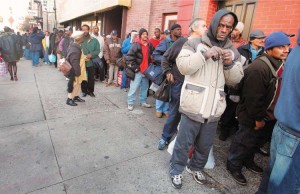 I listened to some talk show rhetoric about the ongoing debate for raising the minimum wage last week. July 24, 2009, was the last time the minimum wage was increased to the current $7.25 per hour. Some in Congress would like to increase the minimum to $10.10 per hour. In theory it all sounds good. Perhaps it helps to ease the conscience. Maybe, it’ll even help to win votes at mid-term. While I would never deny anyone a livable wage, I don’t think the answer for addressing poverty is found in increasing the minimum wage. It’s a temporary bandage that doesn’t cover the oozing infection of poverty.
I listened to some talk show rhetoric about the ongoing debate for raising the minimum wage last week. July 24, 2009, was the last time the minimum wage was increased to the current $7.25 per hour. Some in Congress would like to increase the minimum to $10.10 per hour. In theory it all sounds good. Perhaps it helps to ease the conscience. Maybe, it’ll even help to win votes at mid-term. While I would never deny anyone a livable wage, I don’t think the answer for addressing poverty is found in increasing the minimum wage. It’s a temporary bandage that doesn’t cover the oozing infection of poverty.
Raising the minimum wage will proportionately increase the cost of goods and services especially in service industries like hospitality and food/beverage. Increased costs are passed onto the consumer, which results in rising product costs. It’s sort of vicious circle and we’ll be back at the same place in two more years. Raising the minimum wage will hinder job growth and even eliminate some existing jobs. As a former small business owner, I could not have sustained a nearly 30% increase in payroll costs without eliminating positions and benefits. To put additional dollars per week into one paycheck at the expense of someone else’s job doesn’t make sense to me. Somewhere along the way government needs to realize the small business owner’s pocketbook isn’t a deep well. Then there’s the whole 29-hour per week benefits threshold thing with the Affordable Healthcare Act, but that’s a whole other story. The political rhetoric isn’t really the reason for my post.
I think the real answer to addressing poverty is found in job creation, innovation, and education. Shouldn’t we focus on creating jobs that sustain? Job growth in America is dismal at best with the lowest recently posted job creation numbers since early 2011. Creating jobs that sustain requires a skilled and educated labor force. This means assisting the unskilled or under-skilled worker with training, education and skills development. Here’s something communities of faith can do to assist in the process. A number of years ago in my former pastorate, the church joined forces with a group called Christian Women’s Job Corp. The purpose was to equip women for life and employment. By providing a venue to develop confidence and job skills, students often landed better career opportunities. Maybe this is about teaching someone to fish rather than giving a fish a day. Better employment creates greater self-worth and confidence while providing for the financial needs of the individual and families.
How do you think we (the church or a community of faith) can make a difference? How can we do our part? We’re called to aid the poor. Does that mean a daily contribution or does it mean we help others to stand on their own two feet – giving the gift of confidence, self-worth, and dignity? Do we perpetuate a system that’s broken or do we try to change a life or family at a time? I vote for changing lives!




I absolutely agree – raising the minimum wage is like offering more welfare; it does not solve the problem. If a person can obtain everything they need/want via handouts or via an entry level low skill job, there is no incentive to improve job skills. (Not talking about those unable to work). We have compromised our entire system (beginning with schools) and do not expect people to achieve on their own.
A few people need help for a lifetime; some people need help for a short time; the government however should get out of the way and let free markets and charitable individuals provide the help. We have got to return to the days of “individual responsibility”.
What’s the old definition of crazy – doing the same things over and over again while expecting different results. I think the situation requires a very different approach instead of just raising the minimum wage.